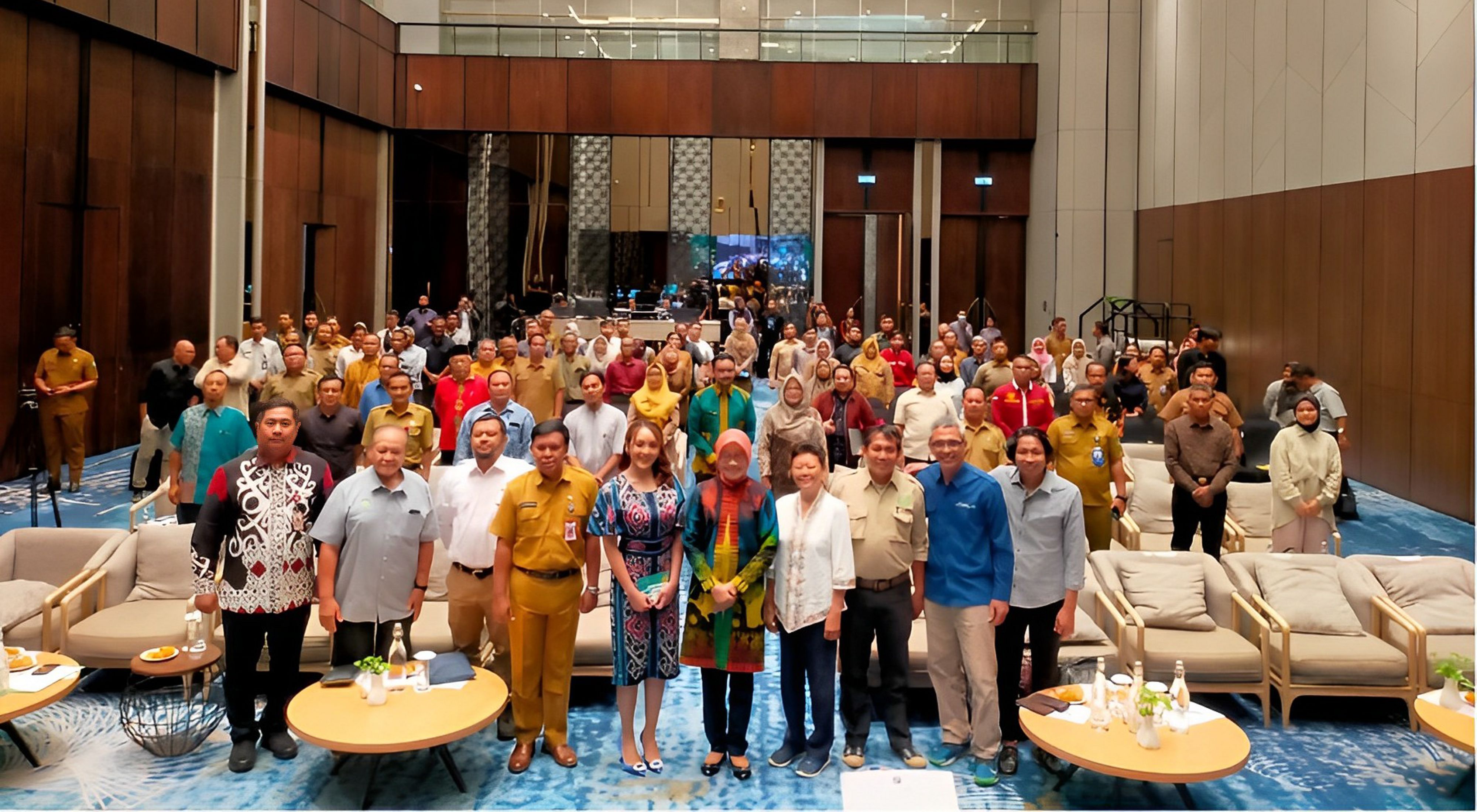Media Contacts
-
Maria Adityasari
Communications Specialist YKAN
Yayasan Konservasi Alam Nusantara
Email: maria.adityasari@ykan.or.id
Sustainable management of Peatlands in East Kalimantan needs to be done in a participatory and collaborative manner and was emphasized by the Regional Secretary of the Province of East Kalimantan Sri Wahyuni when opening the "Ekspose Pengelolaan Lahan Basah Berbasis Masyarakat di Kalimantan Timur" activity on Tuesday, 11 July 2023, in Samarinda, East Kalimantan.
This activity was attended by keynote speakers from the Peat and Mangrove Restoration Agency, as well as speakers representing Dewan Daerah Perubahan Iklim (DDPI), Yayasan Konservasi Alam Nusantara (YKAN), Yayasan Mangrove Lestari (YML), Yayasan Biosfer Manusia (Bioma), Yayasan Konservasi Khatulistiwa Indonesia (Yasiwa), and Perisai Alam Borneo.

Sri added the work program from development partners in managing peatlands in East Kalimantan has helped achieve the province's emission reduction target. "The highlight today is combining conservation programs with community empowerment," said Sri. In this case, citizen participation is high, and residents can feel program achievements directly.
Expose four Peatland ecosystems
There are four management areas described on this occasion. The four are Muara Siran Village peatlands, Anggana District mangroves, Semanting Village, and swamps and riparian areas in Mesang-Suwi.
"It can be seen from the four areas the role of the community is the key to the success of sustainable management of peatlands," said the Chief Executive of the East Kalimantan DDPI, Professor Daddy Ruhiyat, on the same occasion. Community collaboration with development partners, local governments, and the business world can be found in every peatland management landscape featured in today's expose. "These are natural resource management models that we encourage and have proven sustainable in East Kalimantan," said Professor Daddy.

The umbrella for this peatland management program is the Green Growth Compact (GGC). GGC is a collaborative action involving various parties, including the government, private sector, non-governmental organizations, universities, indigenous peoples, and civil society, to accelerate the achievement of the Green East Kalimantan (Kaltim) goal.
Since the GGC was declared in 2016, 13 landscape-based natural resource management model initiatives have been implemented. Three model initiatives, specifically for peatland management, namely the Mahakam Delta Management Partnership, the Mesang-Suwi Wetland Protection Partnership, and Collaborative Management of the Muara Siran Peat Ecosystem. Another model initiative is the Berau Forest Carbon Program, which also manages mangroves in Kampung Teluk Semanting, Berau District.
Each ecosystem in the four model initiatives has its characteristics and challenges. The Mangrove Lestari Foundation is a partner who assists in managing mangrove ecosystems in the Mahakam Delta landscape, Kutai Kartanegara Regency, which has been damaged due to pressure from land clearing. This degradation has reduced marine production stocks and increased disease in aquaculture activities. In this area, there are also important species of proboscis monkeys.
Meanwhile, in Mesang-Suwi, East Kutai Regency, the Ulin and Yasiwa Foundations are collaborating to manage an essential ecosystem area with an endemic species of the black badass crocodile (Crocodylus siamensis). In Muara Siran, the Bioma Foundation assists communities living around peat areas. And Perisai Alam Borneo assists the community in managing the mangrove ecosystem in Kampung Teluk Semanting.

Community-based peatland management
YKAN, through the Climate Change Mitigation Framework strategy, supports community-based management of peatlands that harmonizes the ecological needs and welfare of the residents. Together with DDPI, YKAN coordinates, facilitates, and increases the capacity of development partners directly involved in managing wetlands, namely YML, Yasiwa, Bioma Foundation, and Perisai Alam Borneo.
The four development partners also push for an approach to managing wetlands combined with participatory protection by enhancing the community's alternative economy. For example, cultivating swallow nests in Muara Siran has made the local community more concerned about the peat ecosystem. They realize that if the peatlands are damaged, the production of swallow nests will decrease.
The same is true for people in the Mahakam Delta. Women in this area are accompanied to make processed fishery products while protecting the mangrove ecosystem, essential in maintaining fish catches. In Semanting Bay, villagers are developing their village as a mangrove tourism destination. Here, visitors can camp and see proboscis monkeys directly.

"The increase in the alternative economy slowly opens awareness that the environment around protected residents can also produce. What East Kalimantan is currently doing is not ideal. Still, at least with commitment and collaboration, wetlands can remain sustainable," said Alfan Subekti, YKAN's Green Development Senior Manager, who was also the main speaker at the expo.
Yayasan Konservasi Alam Nusantara (YKAN) is a scientific-based non-profit organization that has been present in Indonesia since 2014. With the mission of protecting lands and waters as life support systems, we provide innovative solutions to realize the harmony of nature and humans through effective natural resource management, prioritizing a non-confrontational approach, and building a network of partnerships with all stakeholders for a sustainable Indonesia. For more information, visit ykan.or.id.


